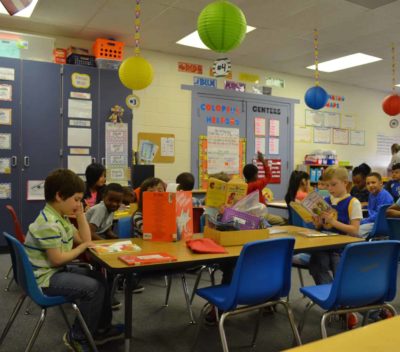Education leaders from around the state gathered in Durham at the Burroughs Wellcome Fund offices last week to attend the Aspiring Superintendents Program run by the North Carolina School Superintendents Association.
District leaders weighed in on the legislation in the General Assembly they found most important. Topics such as mandated class size reductions and school calendar flexibility topped many leaders’ minds, but they also touched on topics like teacher and principal pay.
House Bill 13 and Class Size Reductions
During the short session last year, the General Assembly mandated class size restrictions in K-3 classes that some districts say could be costly. District leaders voiced concerns about eliminating certain extracurricular classes, as well as finding the money to hire new teachers and increase facility space. House Bill 13 would loosen the class size restrictions. It made its way through the House but has not yet been taken up in the Senate.
Aaron Woody, assistant superintendent of curriculum and instruction, Asheboro City Schools
“We’ve looked at space. We’ve looked at what it’s going to mean in terms of hiring folks. It could be as many as 12 or 13 teaching positions across five elementary schools. So that’s probably our biggest concern right now would be that piece.”
Tanya Turner, assistant superintendent, Edenton-Chowan Schools
“It could really cause us to have to cut … not only a lot of positions but also programs. We’re looking to lose our art, music, PE in elementary schools, and that could be really devastating to us. We’re really working right now to help the county commissioners understand the impact this could have to us and hopefully persuade them to understand that if this does happen, that they could reach out and help us.”
Rob Jackson, superintendent, Edenton-Chowan Schools
“The biggest issue that we’re paying attention to is the K-3 class size issue because it has the potential to radically impact how we approach what we’re doing next year in terms of…financing for seven positions, whether that’s cutting positions or asking our County Commissioners for additional resources.”
Calendar Flexibility
Several bills have been filed in the General Assembly to grant school calendar flexibility to specific districts or to all districts in the state. At present, the General Assembly mandates schools’ start and end dates.
Traditional-calendar schools must start no sooner than the Monday closest to August 26 and finish no later than the Friday closest to June 11. The flexibility bills would allow districts to elect their start and end dates.
Rob Jackson, superintendent, Edenton-Chowan Schools
“We’ve fought for a long time for local flexibility and would much prefer that.”
“We’re hopeful that this year something may be done. With the flooding we had this year with Hurricane Matthew, with the winter weather we’ve had, we’re really having a tough time with make up days.”
Chris Barnes, director of human resources, Whiteville City Schools
“If we’re not able to get on the same schedule as the community colleges, all these Career and College Promise students that we’re promoting are left completely inaccessible for several course offerings because they just can’t fit them in their schedule. Last year we went to the end of January with our first semester.”
Teacher Pay
Increasing teacher pay has led agendas over the last few years in the General Assembly. The teacher pay plan passed in the 2016 short session budget compromise is a multi-year plan with the goal of an average salary for teachers of almost $55,000 in three years.
In the short session, the legislature passed a 4.7 percent increase in average teacher salary, which lawmakers said would bring average salaries up to just over $50,000 in fiscal year 2016-17. The average fell just short, reaching $49,837.
So far this year, the only budget proposal introduced has been that of Democratic Governor Roy Cooper. His plan proposed spending $271 million in each of the next two years to increase teacher salaries an average of 5 percent in both 2017-18 and 2018-19.
Felisha Whitaker, director of student accountability, assessment and secondary education, Northampton County Schools
“Coming from a small district and being competitive, the fact that we really haven’t had a significant increase in teacher pay in the last several years really does hurt us, because as small districts, it’s hard to compete with some of the larger metropolitan districts.”
Principal Pay
Difficulties with the principal pay schedule have existed for several years in North Carolina. Since 2015, a joint legislative study committee on school-based administrator pay has explored the issue. And last week Senate leaders announced proposed legislation that would give the equivalent of a 7 percent increase in the average principal salary to each school district. The funds would come from the state lottery and would be given in a lump sum that the superintendent of that district would distribute.
The governor’s budget proposal would provide an average 6.5 percent salary increase for principals and assistant principals.
The following response was elicited before the Senate’s principal pay legislation was announced.
Anne Marie Radke, principal at East Union Middle School, Union County Schools
“We’re 50th out of 51 in the nation. Very concerned about that … We really pushed and we really loved that the Senate heard us as far as our teachers, but by being that type of servant leader and kind of pushing ourselves to the side, we’ve kind of gotten ourselves into a position that it’s no longer attractive to be an administrator in North Carolina, being that low on the pay scale.”



